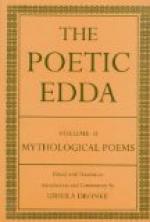H. “Thou dost well, son of vikings, to give me the sword from the howe. I think its possession better than to win all Norway.”
Her father warns her of the curse, and the doom that the sword will bring, and she leaves the howes followed by his vain wish: “Would that I could give thee the lives of us twelve, the strength and energy that we sons of Arngrim left behind us!”
It is unnecessary here to continue the story as the saga does, working out the doom over later generations; over Hervoer’s son Heidrek, who forfeited his head to Odin in a riddle-contest, and over his children, another Angantyr, Hlod, and a second Hervoer. The verse sources for this latter part are very corrupt.
A full discussion of the relation between the Eddic and the Continental versions of the heroic tales summarised in the foregoing pages would, of course, be far beyond the scope of this study; the utmost that can be done in that direction is to suggest a few points. Three of the stories are not concerned in this section: Helgi and Frodi are purely Scandinavian cycles; while though Angantyr is a well-known heroic name (in Widsith Ongendtheow is king of the Swedes), the legend attached to his name in the Norse sources does not survive elsewhere. The Weland cycle is perhaps common property. None of the versions localise it, for the names in Voelundarkvida, Wolfdale, Myrkwood, &c., are conventional heroic place-names. It was popular at a very early date in England, and is probably a Pan-Germanic legend. The Sigurd and Hild stories, on the contrary, are both, in all versions, localised on the Continent, the former by the Rhine, the latter in Friesland or Jutland; both, therefore, in Low German country, whence they must have spread to the other Germanic lands. To England they were doubtless carried by the Low German invaders of the sixth century. On the question of their passage to the North there are wide differences of opinion. Most scholars agree that there was an earlier and a later passage, the first taking Hild, Ermanric, and the Volsung story; the second, about the twelfth or thirteenth century, the Volsungs again, with perhaps Dietrich and Attila. But there is much disagreement as to the date of the first transmission. Muellenhoff put it as early as 600; Konrad Maurer, in the ninth and tenth centuries; while Dr. Golther is of opinion that the Volsung story passed first to the vikings in France, and then westward over Ireland to Iceland; therefore also not before the ninth century. Such evidence as is afforded by the very slight English references makes it probable that the Scandinavians had the tales later than the English, a view supported by the more highly developed form of the Norse version, and, in the case of the Volsung cycle, its greater likeness to the Continental German. The earliest Norse references which can be approximately dated are in the Skald Bragi (first half of the ninth century), who knew all three stories:




